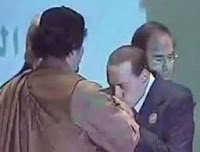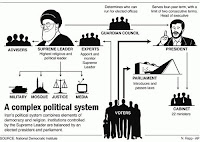A man who knew too much !

Whether the NATO countries -- who had only a few years ago welcomed Col. Muammar al-Qaddafi back into the international fold in exchange for his renouncing his chemical and nuclear weapons programs and allowing U.S. and British experts to come and help dismantle them -- played any role in what certainly appeared in first reports from the scene to have been the summary execution of the Libyan dictator will
probably never be known. What the video evidence does prove is that the Libyan revolutionary forces did not find him already dead or killed by a NATO airstrike; nor does the initial claim that he was killed in "crossfire" between insurgent forces and diehard regime loyalists stand up to even the most minimal scrutiny.
NATO does acknowledge that its planes bombarded the convoy in which Qaddafi was fleeing the city of Sirte shortly before it was intercepted on the ground by the insurgents, but it has denied it even knew he was there. If that is true, and the French, British, and Americans did not try to make their own luck, then they certainly were very lucky indeed.
Qaddafi was, quite simply, a man who knew too much. Taken alive, he would have almost certainly have been handed over to the International Criminal Court (ICC), which had indicted him -- along with his son, Saif al-Islam, and brother-in-law and military intelligence chief Abdullah Senussi (whereabouts unknown) -- for crimes against humanity in late June. Imagine the stir he would have made in The Hague. There, along with any number of fantasies and false accusations, he would almost certainly have revealed the extent of his intimate relations with French President Nicolas Sarkozy and British Prime Minister Tony Blair, the details of his government's collaboration with Western intelligence services in counterterrorism, with the European Union in limiting migration from Libyan shores, and in the granting of major contracts to big Western oil and construction firms.
He would have had much to tell, for this cooperation was extensive. In the war against the jihadis -- a war to which Qaddafi regularly claimed to be as committed to prosecuting as Washington, Paris, or London -- links between Libyan intelligence and the CIA were particularly strong, as an archive of secret documents unearthed by Human Rights Watch researchers has revealed. If anything, the CIA's British counterpart, MI6, was even more involved with the Qaddafi family. As the Guardian reported in early September, it was Sir Mark Allen, then the director of the counterterrorism section of MI6, the British overseas spying agency, who was the key figure on the Western side in the secret negotiations to get Qaddafi to give up his WMD programs. The Guardian story further laid out how, after failing to become director of MI6 in 2004, Allen went into the private sector, becoming a senior advisor to the Monitor Group, a consulting firm that was paid huge fees by Qaddafi to burnish his image around the world, and, while they were at it, helped Saif (who had been his father's initial envoy to MI6) research his PhD thesis for the London School of Economics (LSE). Allen was also an advisor to BP, helping the oil giant secure major contracts in Libya from the Qaddafi regime.
The idea that Allen was the only senior Western official to establish such close ties with the Libyan dictator and his family is ludicrous. To the contrary, both the British and French governments were soon falling all over themselves to curry favor with a newly "respectable" Qaddafi. The Daily Mail reproduced a facsimile of the letter that, while prime minister, Tony Blair wrote to Saif Qaddafi to help him with his research for his LSE doctorate. Both during Blair's premiership and that of his successor, Gordon Brown, Britain aggressively pursued sales of military equipment, up to and including warships, to the Libyan regime, and sent members of the elite Special Air Service (SAS, the equivalent of the U.S. Delta Force) to help train Qaddafi's forces in counterterrorism tactics. Not to be outdone, Sarkozy, to the consternation even of many members of his own cabinet, invited Qaddafi to Paris in Dec. 2007, for an official state visit, the upshot of which was billions of dollars in contracts from Libya won by French firms.
To be sure, when the Libyan uprising began, it was Sarkozy who was the driving force behind the NATO intervention that -- though it was ostensibly carrying out United Nations Security Council resolutions to protect Libyan civilians from Qaddafi and his forces under the new doctrine of the Responsibility to Protect (R2P) -- soon far exceeded its mandate. The Libya intervention revealed itself to be based on the premise that, in Libya at least, R2P and regime change could be one and the same. Moreover, from the beginning of the air campaign, NATO warplanes repeatedly targeted Qaddafi, his sons, and their families. As early as May, General Sir David Richards, the chief of the British defense staff (that is, the equivalent of our head of the Joint Chiefs), told the Daily Telegraph that while NATO was not targeting Qaddafi directly, "If it happened that he was in a command and control center that was hit by NATO and he was killed, then that is within the rules."
Many outside observers were convinced even at the time that NATO was in fact desperately hoping to kill Qaddafi since it was clear by then -- especially during a period when the tide seemed to shift back and forth between Qaddafi's forces and the rebels -- that he would not relinquish power, no matter what offers were made to him in exchange for doing so. Their suspicions were confirmed when a member of the U.S. House Armed Services Committee, Congressman Mike Turner (R-Ohio), revealed that he had been told by Admiral Samuel Locklear, the U.S. officer commanding NATO's Joint Operations Command in Naples, Italy, that NATO forces actually were actively targeting Qaddafi.
Qaddafi's death in such a strike would have offered a neat ending then for the West and for the Libyan insurgency, many of whose leaders, it should be remembered, served Qaddafi long and faithfully, enjoying his favors for much of their careers. Qaddafi certainly knew enough about their sins to make the prospect of what he might say during a trial before the ICC a cause for anxiety. His death, coming as it seems to have done, at the hands of Libyans rather than NATO, makes an even neater ending now.
Qaddafi is dead, the Arab Spring has one more jewel in its crown, and the doctrine of humanitarian military intervention, whose reputation has rather faded of late, seems to have acquired a whole new bloom. The Arab masses thirsting for democracy, the Western powers using their power in support of this morally irreproachable goal -- what could be more edifying?
And so, ever since it became clear that Qaddafi's reign was over, the great and the good have been indulging themselves in an orgy of self-congratulation. Qaddafi alive would have been the ghost at that particular banquet, threatening at any moment to spoil the fun. Dead, he poses no such threat. It is unlikely that even the thorough investigation into the circumstances of his death that has been called for by Navi Pillay, the U.N. High Commissioner for Human Rights, and seconded by Amnesty International and Human Rights Watch, will change this fundamental equation. And even if Qaddafi was not targeted and, as Omran al-Oweib, the electrical engineer-turned-rebel leader who commanded the forces that finally caught up with Qaddafi in a tunnel just outside Sirte, continues to insist, really was killed in a crossfire, leaders like Sarkozy, Blair, Brown, and the Bush State Department must surely be sleeping better these last few nights. Whether they deserve to is another question entirely. (Thanks to D. Rieff )
Here is the actual footage to the Lynching of Qaddafi.



Comments